- Home
- Nnedi Okorafor
Ikenga Page 3
Ikenga Read online
Page 3
He took the glass of water to his mother and watched her drink. “Thank you, Nnamdi.”
He hugged his mother again.
Later, his feet took him to the back of the house, to his father’s garden. He walked among the weeds and sat down. His eye fell on a feeble but still living yam vine.
“I’ll take care of you,” he whispered to the plant. He’d take care of the whole garden from now on, he decided. He sighed and then he wished for one thing with all his heart: that he was a grown man who could protect his mother. As he caressed the yam’s delicate green vine, he knew full well that it was a stupid wish.
The Ikenga
NNAMDI HATED THE brand-new scratchy white caftan and pants he had to wear and he resisted the urge to scratch in front of everyone. He was hot, the music was too loud, and he didn’t want to talk to all these people. It seemed all of Kaleria had come out for the one-year memorial celebration of his father’s life.
There were coolers full of jollof rice and goat meat, vegetable soup, spicy stew and pounded yam, fried plantain, and plenty of beer and palm wine. Free food, free festivities. Everyone was invited. And everyone came. It was nine p.m., and the party would probably continue well into the early morning. Nnamdi wondered how his mother could afford all this. He also knew that if he asked, his mother would only say, “God provides.” Probably the women’s club had paid for it. If that were true, he wondered why they didn’t help out with money on other days.
His friends Ruff Diamond, Jide, and Hassan had come with their parents and siblings, of course. They stood near the wall, watching the guests mill about eating, talking, and dancing.
“Did you see that fine girl over there?” Ruff Diamond asked. He carried a plate of jollof rice and chicken in one hand and he shoveled some of the rice into his mouth with his plastic spoon.
“No,” Nnamdi said, rolling his eyes.
“That’s because you weren’t looking hard enough,” Ruff Diamond said. “Come on, have some fun. I’m tired of your sulking.” He held a spoonful of jollof rice to Nnamdi’s face. “Eat. It’s delicious and you look dried like stockfish.”
Nnamdi shoved the spoon away, cracking a smile. Debo Okunuga, known more commonly as Ruff Diamond, was bigger than Nnamdi, and each day after school he would bring out a pair of diamond earrings and put them on. “These teachers won’t let me wear my diamonds in class,” he would always say with a shrug. “Teachers, always jealous of rich guys like me!” Ruff Diamond was beyond proud of these earrings and claimed they cost two hundred and fifty thousand naira each. Nnamdi believed the earrings were expensive but not that expensive.
“Maybe you’re too busy looking for Chioma?” Jide said, pushing up his black glasses as he drank from a bottle of Coca-Cola. Nnamdi rolled his eyes again. For over a year, Nnamdi had known that Jide was the one who liked Chioma, but Chioma never gave Jide the time of day.
“It’s my father’s memorial,” Nnamdi said. “Why would I . . . ?”
“Because the best place to meet girls is at events like this,” Hassan said. He put his plate, laden with only hunks of goat meat, on the ground just so that he could dramatically slap hands with Ruff Diamond. The two laughed raucously.
“Hey, I’m going to Abuja for a few days,” Ruff Diamond said. “The girls are fine there, sha. But not like here. You should keep your eyes open, Nnamdi.”
“So I can always remember that I met her at the anniversary of my father’s murder?” Nnamdi suddenly snapped. He paused, feeling the darkness and weight of his father’s death press on him yet again. His friends looked anywhere but at him. Nnamdi took a deep breath. “Sorry, guys,” he said.
Ruff Diamond patted him on the back. “It’s all right.”
Nnamdi was glad when his mother called him over to come and say hello to his grand-auntie Grace.
“Praise God,” Auntie Grace proclaimed, pulling him into a tight hug. She was very fat, tall, and strong and she wore a black drape of a dress made of a thick, coarse material. Hugging her was suffocating, hot, and scratchy. “Praise him, o! We are here today, gathered despite the loss of my sweet, sweet brother.”
“Yes, Auntie,” Nnamdi said, stepping back.
“Do you miss him?” she asked. Before Nnamdi could respond, she said, “I miss him. But he’s with God now.” She grinned at Nnamdi, though he knew full well that she wasn’t really seeing him. Auntie Grace was nice, but she was never fully there; she was always more occupied with whatever prayer she was praying.
“I prayed for him every day when he was alive,” she said. “When he was fighting all of those criminals. Trying to be Kaleria’s superhero. Do you like superheroes, Nnamdi?” He opened his mouth to answer. He loved superheroes. Especially icons like Naruto, Superman, Black Panther, Storm, and his favorite, the Incredible Hulk. Superheroes got to view the world differently because their lives were so crazy; they could be anyone and they could dive into danger when it was at its worst and win. Superheroes survived. Nnamdi would have loved to have a conversation about all this with even Auntie Grace but instead she kept talking. “Your father wasn’t a superhero; he was more. He was a messenger of God. Now he’s with the Lord.” She nodded, whispering, “He’s better off.”
Nnamdi frowned. He felt his father would have been better off with him and his mother. Auntie Grace’s attention was back to his mother and two other women. “We should all pray!” Auntie Grace proclaimed, putting a big hand on his mother’s shoulder.
Once his auntie started making people pray, those present lost at least an hour of their lives as she went on and on. Nnamdi was standing behind her and he took the chance to slip away. He was between two tents, about to sneak away from the party, into the tall plants of his father’s garden despite the mosquitoes and other night creatures, when he heard, “Nnamdi! There you are!”
He cringed but then recognized the voice over all the noise. “Chioma,” he said, turning around. He smiled. Like most of the girls and women at the memorial, she was wearing a rapa and matching top; hers was a loud yellow. She moved slowly, her tightly wrapped rapa limiting the length of her stride. Nnamdi and Chioma slapped hands.
“I’ve been here for twenty minutes but couldn’t find you anywhere,” she said. She took a sip from her bottle of Bitter Lemon.
“I’m not in the mood for any of this,” he said, leaning against the wall of the house.
“Hmm. Well, the party’s more for your mother, really,” she said. “To usher her out of mourning and back into the community. You should be relieved. She won’t have to wear black anymore.” She patted her belly. “Whoo, I’m stuffed.”
“I’m glad for my mum, but I don’t really want to be here.”
“Oh, Nnamdi,” she laughed. “You’re such a good, obedient son.”
A shadow caught Nnamdi’s eye and he turned and squinted in the darkness. “You see that?” he asked.
Chioma craned her neck and squinted, too. “No.”
“What is that?” He stepped past Chioma for a better look. “Or who?” The shadow was human-shaped and heading toward the gate, moving around the vehicles parked on the blacktop around the compound. “Hey!” he called. Whoever it was stepped into the light and seemed to look at them. But even in the light shining from the house, Nnamdi could barely see him. Yes, it was a him. A man. Then the man did the impossible. He stepped right through the wall beside the open gate! At least that’s what Nnamdi thought he saw. The man skipped around the parked cars and disappeared from Nnamdi’s view.
“Hey!” Nnamdi called again, pushing the gate open and stepping through it.
Behind him, he heard Chioma shout, “Leave him. You don’t know who that is.”
Nnamdi caught another glimpse of the shadowy man. He seemed to be walking quickly down the street, disappearing into shadows and reappearing in pockets of light from houses and streetlights. The man stopped and gestured to Nnamdi to follow. Nnam
di hesitated, frowning. He blinked, thinking of his dead father, his mother robbed, the Chief of Chiefs disrespecting his father’s funeral last year, and something new washed over him. He tensed his body and balled his fists. “No,” he whispered. “This is my house.” He would protect his home by any means necessary. He took off after the shadowy man. “Hey!” he called.
“Nnamdi!” Chioma shouted. “It’s dark out there! Stop! Just let him go!”
Nnamdi ran into the darkness of the dirt road, frantically looking from side to side. There. He heard the man’s footsteps running off to the right, down the narrow track, and so he ran in that direction, too. The night was pitch-black as he passed gated house after gated house. The sound of the memorial celebration quickly faded, as did Chioma’s voice. The wind picked up and it propelled him faster. It was exhilarating to run like crazy in the dark after . . . what? A thief? He didn’t know. But now that he actually had a chance to do something, he was going to catch up with the man who had the nerve to come to his home uninvited.
He could hear his own breathing and the soft slap of his shoes in the dirt. His clothes were getting soiled, but he couldn’t worry about that at the moment. He rounded a bend. Thankfully, he knew this road like the back of his hand, even in the dark. He wasn’t far from where the old woman liked to fry and sell akara. He stopped and his legs shook with adrenaline.
There stood the man.
Yards away, under the streetlight.
Waiting?
Nnamdi’s entire body was shaking. But as he stared at the shadowy man, he felt his heart leap. “Oh my God,” he whispered. The man wasn’t a shadow anymore. Nnamdi paused. Then he slowly walked toward him. The man was tall and wore black pants, a black long-sleeved shirt, and . . . a green beret. Nnamdi stopped, four feet away, his heart doing a dance in his chest. The man’s back was turned. Standing about six feet tall, his shoulders were broad and slightly hunched forward. His hands were at his sides, the fingers thick and long. Nnamdi breathed through his mouth and shut his eyes. When he opened them, the man was still there. There was only one thing to ask. “Daddy? Daddy, is that you?”
The night was warm and dark. The streets were empty. Nnamdi’s world had become the patch of land beneath the streetlight, the man, and himself. Nnamdi stepped into the light and the man turned around. Nnamdi’s mouth fell open, the world swam around him, and then his vision cleared. He looked deep into his father’s eyes.
“Nnamdimma, my son,” his father whispered.
“But . . . you’re dead,” Nnamdi said. “I saw . . . your body at . . . at the funeral.” The breeze blew, and right before his eyes he saw his father’s chest and head grow transparent and then solid again. “Kai!” Nnamdi exclaimed. “You’re a spirit, o!” He stepped back, thinking of how his auntie Grace often warned him about “the devil in disguise.” The man’s beret even had the silver elephant emblem in front. In his chest, Nnamdi felt the longing for his father like something pulling at his heart. He could even smell his father’s cologne. Run! he thought. But he couldn’t. He flexed his legs and then relaxed. Tears came to his eyes. It had been a year, yet in this moment, the reality of his father’s death washed over Nnamdi more strongly than he’d ever experienced. The moment left him breathless.
His father held up his hands and then dropped them back to his sides. He sighed. “I’m sorry I died, my son,” he said.
Nnamdi’s shoulders shuddered as he fought his emotions. Even with all the effort, he couldn’t help starting to sniffle. His father’s voice, his scent, his everything. He missed him so, so much. The words tumbled from him like overdue rain. “Mommy . . . they got Mommy,” he blurted. “Last week. It was the guy they call Never Die! Mommy is . . .”
“I know.”
“Mommy’s had to start selling tapioca! And that’s how . . .”
“I know,” his father said more firmly.
“She curses you every day!” Tears dribbled from Nnamdi’s eyes. “And . . . and I don’t blame her! Why’d you have to go and get yourself . . . killed like that? Now Mommy has to struggle! No one respects her enough to protect her now. We’re lucky we still have our house! The thieves will descend on us soon, Daddy! As revenge against you! You didn’t finish what you started. And I can’t do anything about it!”
Nnamdi took a step forward, his arms half-raised. Then he stepped back and just stood there, sobbing, his arms to his sides. No, he couldn’t run into his father’s arms. Not anymore. His whole body prickled and clenched. Those days were over. His father did not move to comfort Nnamdi either. He, too, just stood there looking sad. After a few moments, Nnamdi asked, “Why are you here?”
“To give you something.”
“Give me something?” Nnamdi wiped the tears from his eyes. “Give me what? What can you possibly give me now?”
“Do you wish to protect your mother?”
“Yes.”
“And Kaleria, as a whole?”
Nnamdi frowned.
“No need to answer right now. It’s too big a question. But you will have to answer it soon enough. I can at least give you what you need, regardless.” He paused, looking hard at Nnamdi. “Hold your breath.”
Nnamdi hesitated, his auntie Grace’s warnings about devils, witches, and demons running through his mind yet again. He looked around. Still, not a car passed on the road. Not a person walked by. Even at night, this was bizarre. It was Saturday. The akara lady made most of her week’s pay on this night. Where was she? Was this the devil bringing him to a secluded place where no one could save him from being tempted to evil? But deep in his gut, he felt this truly was his father, not the devil trying to deceive him. And hadn’t his father always said to trust your gut? He took a deep, deep breath and held it.
“This object, this thing . . .” His father spoke softly as he knelt down and gathered what looked like a pile of dirt at his feet. “It will steal your breath if you breathe while I’m offering it. That is what I am told.” He spoke in a monotone voice, as if he were doing a ritual. He gathered and gathered the dirt into a pile and then it began to gather itself. Nnamdi’s eyes grew wide as he struggled not to breathe.
“An Ikenga,” his father said, scooping up some of the dirt. In his ghostly hands, the dirt rippled like vibrating water. “Know your deep Igbo, my son. Ikenga means ‘place of strength.’ From me to you, my son. To you only. No one else is to touch this. It is your responsibility. It is yours alone.” The dirt made a crackling sound as it fused itself into the shape of an ebony figure with two long spiral horns, seated on a stool grasping what looked like a machete in its bulbous right hand. In its left, which was much smaller, it carried what looked like a planet. Its face was fierce and focused ahead, as if it could see the future and it didn’t like what it saw. Every surface of the object was etched with tiny symbols, except the piercing eyes and thick, unsmiling lips. His father picked up the Ikenga and blew softly on it.
“You can breathe now,” his father said softly.
Nnamdi exhaled and then took a deep breath, filling his lungs. The smell of strong palm wine entered his nose and the sound of the blood rushing in his veins thumped in his ears. He looked at his father.
“This one is old, passed down over and over. It will guide your hand correctly if you calm yourself and focus on the tasks,” his father said.
Nnamdi shook his head to clear it. “What tasks?”
“Hold out your hand.”
Nnamdi slowly held out both of his hands.
“Not the left,” his father snapped. “Only the right. You do not take the Ikenga with any other hand but the right, your aka ikenga.”
Nnamdi frowned, an odd thought popping into his head: “Any other hand”? Why not just say “right hand”? We only have two hands. He brought down his left and slowly, his father set the Ikenga on the palm of his upturned right hand. It was warm, like something alive, and felt oddly heavy, as if it
were full of water. It was larger than his hand and as solid as a ten-pound barbell. Nnamdi grunted and stumbled forward, working not to bring his left hand up to help. But even as he did this, the Ikenga was shrinking, growing lighter and lighter until it was smaller than the palm of his hand.
“There is no advice I can give you for this. I can only give it to you or not give it to you. I choose to give it to you. Chukwu only knows the rest, my son.”
Nnamdi closed his hand around the warm object, more on instinct than anything else. He was looking up at his father, suddenly feeling light-headed and a bit queasy. When he spoke, it felt like he was speaking up from the bottom of a well with a mouth full of warm honey. His words came slowly: “But doesn’t Auntie Grace say that . . .”
Everything went black.
Then he was there again.
His father was slowly fading away.
Nnamdi tried to speak, but his throat was burning as if he’d just swallowed hot pepper soup. He fell to his knees, but his knees were burning, too. And his right hand was burning, still grasping the Ikenga. His face, arms, belly. He shut his eyes. Every part of him felt like it was in flames. Panic. Regret. Should have stayed within the gate, he thought. This was some evil, had to be. Only evil could feel this painful. Maybe this man was the Chief of Chiefs in some sort of crazy disguise. Maybe, like his father, Nnamdi had been shot. Was this what his father had felt as his life drained away? A whimper escaped Nnamdi’s throat as he curled into himself, trying to squeeze out the pain searing through his body.
The pain stopped. He looked at his right hand; the Ikenga was gone. Slowly, Nnamdi stood up. But the ground felt mushy . . . not there? He looked down and nearly screamed. He was floating. “What is . . . ?”
He inhaled and exhaled on the empty road. At least I’m still alive, he thought.

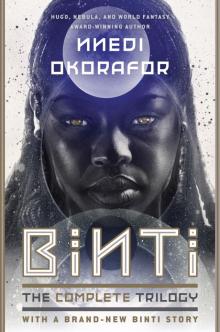 Binti, The Complete Trilogy: Binti ; Home ; The Night Masquerade
Binti, The Complete Trilogy: Binti ; Home ; The Night Masquerade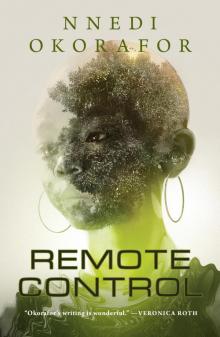 Remote Control
Remote Control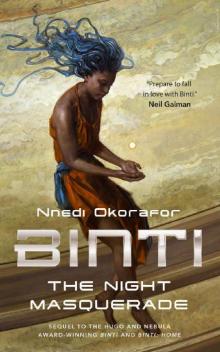 Binti: The Night Masquerade
Binti: The Night Masquerade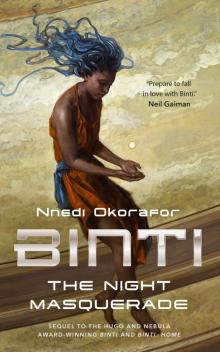 Binti--The Night Masquerade
Binti--The Night Masquerade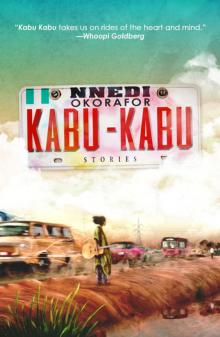 Kabu Kabu
Kabu Kabu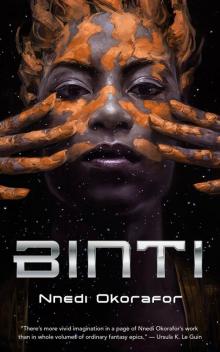 Binti
Binti Zahrah the Windseeker
Zahrah the Windseeker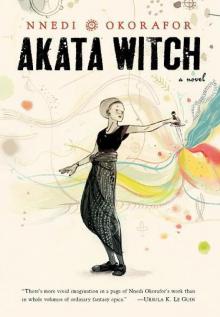 Akata Witch: A Novel
Akata Witch: A Novel Ikenga
Ikenga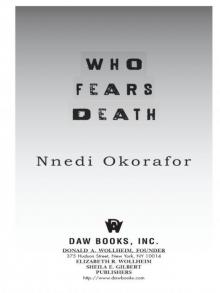 Who Fears Death
Who Fears Death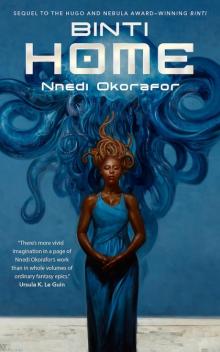 Binti--Home
Binti--Home Lagoon
Lagoon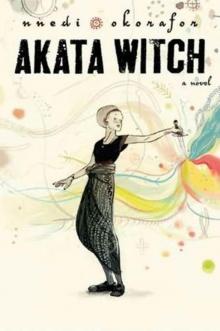 Akata Witch
Akata Witch The Book of Phoenix
The Book of Phoenix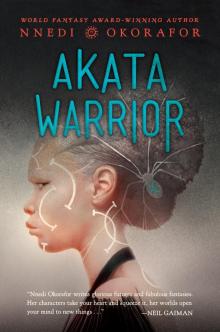 Akata Warrior
Akata Warrior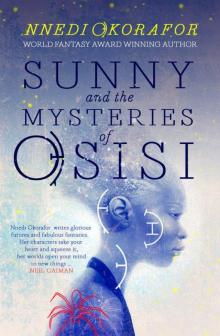 Sunny and the Mysteries of Osisi
Sunny and the Mysteries of Osisi